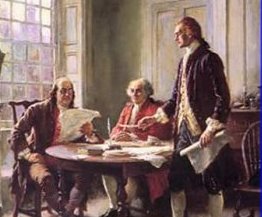Thomas Jefferson
Thomas Jefferson was never sympathetic to the patriotic appeal to natural right. His indelible association with it notwithstanding, Jefferson’s rationale for American political independence from England rested on an entirely different principle.
Jefferson justified his deepseated antipathy toward monarchical government, and rebelled against it, on the grounds that the hereditary and land tenure systems upon which the British monarchy rested violated Saxon law. American colonials, Jefferson privately believed, were justified to seek independence not because Parliament was violating their rights as Englishmen or their rights by Nature, but because the British monarchy was violating their sovereignty in the same way that Britain’s Norman invaders had violated the sovereignty of the Anglo-Saxons.
Jefferson presented his case in A Summary View of the Rights of British America (1774). His peers at the first Virginia Convention rejected his "argument from sovereignty" because it raised awkward questions about His Royal Majesty’s ownership of the American colonies. While the leaders of the independence movement approved of Jefferson’s objective, they were not moved to insert his argument on their masthead.
The failure of Jefferson's argument to gain public endorsement by America's leading patrios did not prevent Jefferson from inserting it into his draft of the Declaration Independence. There one finds that an inalienable "right to revolution" rests on the sovereignty of the people. In Jefferson’s words, “whenever any form of government becomes destructive of these ends (the inherent and unalienable rights to life, liberty and the pursuit of happiness), it is the right of the people to alter or abolish it, and to institute new government, laying its foundation on such principles, and organizing its powers in such form, as to them shall seem most likely to effect their safety and happiness.” This principle was to be the firm foundation on which political freedom in the new American states would rest.
That Jefferson and Adams would have different political views is understandable when one considers the different societies that produced them. Jefferson was born on the edge of civilization and was part of a timeless, unchanging social organism–the plantation. This organism, home to a large majority of his countrymen black and white, had no place for merchants or vendors. It sustained no commerce, no competition between social interests, only an inviolable social hierarchy that existed to serve the interests of the master. Because it was not a town, there were no town meetings and no community enterprises for “political” agents like John Adams to organize and administer. In Jefferson’s Virginia, the yeomanry supported what its headmen decided. Everyone else–citizens of the Lockean state of nature–either went along or left.
Adams, on the other hand, lived in a bustling mercantile society whose members were skilled in using the processes of politics to advance their personal and business interests. Unlike their agrarian cousins to the South, they were entrepreneurs and builders. The Yankees of Adams’ New England lived in a society of private investors who engaged in business for the purpose of realizing profits. For these reasons, Massachusetts had a gritty political society even during the colonial period. Because it was a political society there was a place for political men like John Adams. As a political agent, Adams learned to define and promote political issues, to organize popular support on behalf of specific solutions and to marshal the weight of numbers to accomplish them.
Young Jefferson’s rebellions were against social hierarchies that infringed upon his own personal sovereignty. Adams’ rebellion was
against an institution that infringed on the power he wielded as a political man. Put another way, Adams roused himself to defendt his
authority as a political agent. Jefferson roused himself to defend his prerogative as a sovereign individual. Both men conceived of republican government as a reliable means to prevent the abuse they rebelled against. Adams saw it as a way to create government by the best and brightest. Jefferson saw it as a way to prevent power from pooling in the hands of the governing class that Adams conceived as necessary to run a republic.
Jefferson ultimately became a political man like Adams. When he finally completed this slow transformation, which he did after becoming enlightened in France, he adopted Adams’ political method and launched another great political rebellion. He refered to it as "the second American Revolution." Like his earlier political rebellions, this one was against an emerging tyranny, only now the tyrant was his former compatriot.
Jefferson unknowingly prepared himself for his final political rebellion while serving as the American Minister to France. There he came under the instruction of Pierre-George Cabanis and the liberal thinkers who formed the small core of Madame Helvetius’s salon. With the help of his mentor and the philosophes who completed Cabanis' small circle, Jefferson digested the enlightened French doctrine of progress. Under Cabanis’s tutelage, that is, Jefferson mastered a new style of thinking. In this new frame of mind, he could see that his earlier political rebellions were essential links in a coherent and encompassing chain. What he already appreciated as a virtuous new form of government he now perceived as an essential part of a great and inevitable advance in the human condition. Man and society could be infinitely perfected, Jefferson learned in France, through the application of enlightened Reason.
Jefferson was in Paris when the people of France took their first steps in this glorious march of human progress. He left France before his enlightened vision of an American styled French republic could be shredded by the bloody reality of political warfare and anarchy. He returned home a new political man with the conviction that the solutions to the problems of man in society could be achieved by applying enlightened reason.
Back on American soil Jefferson found a request from President Washington that he join his new administration as the first Secretary of State. Jefferson reluctantly acquiesced and entered small circle that consisted of Washington’s most trusted political advisors. He soon became alarmed by the views his colleagues expressed. If acted on, Jefferson concluded, Washington’s aides would create the same sort of tyranny he had rebelled against as a young radical and again while serving as Minister to France.
Driven by fear and anger, Jefferson quietly laid plans to subvert their budding tyranny. He could not bring himself launch this new rebellion in Washington’s presence, but when the great man retired Jefferson allowed his republican deputies to commence a public campaign. The victory he won over Adams and his Federalist Party in the presidential election of 1800 marks the final step in Jefferson’s transformation from the young radical who withdrew from the American Revolution and failed to dismantle the social hierarchy that ruled his native state. It also marks the birth of American as a modern political society.





